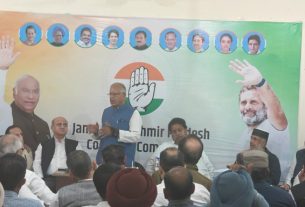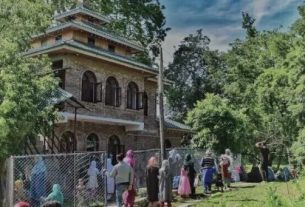New Delhi: Union Home Minister Amit Shah today reiterated that elections in Jammu and Kashmir would be conducted as per Supreme Court schedule and the statehood will be decided after the assembly puts forth the request.
“We will hold the elections in Jammu and Kashmir as per the court dates. As far as statehood is concerned, we will decide after the assembly puts forth the request. I have said this many times in Parliament as well,” Shah said in an interview with a national newspaper.
Shah expressed confidence that the BJP-NDA would achieve its target of securing 400 seats in the ongoing election. He stated that the party is poised to win around 200 seats out of the 283 contested in the initial three phases alone
“It’s difficult to assess the third phase right away. I was busy with my election in this phase. But, I believe that by counting all three phases together, we should be in the range of 175-200 seats (of the 283 polled). So, yes it will be 400 paar in this election,” he said.
“We will gain in Punjab, may be symbolic, but we will make a good beginning. We will maintain our numbers in the Northeast. We will make significant gains in West Bengal, Odisha, Telangana and Andhra Pradesh. We will also make gains in Uttar Pradesh. In Tamil Nadu and Kerala, besides increasing our vote share substantially, we will also win seats.”
Shah said If Congress says that they will bring personal laws in this country, then any ‘panth nirpeksh’ society should debate it. “I don’t use the word secular but in any ‘panth nirpeksh’ country, how can laws be implemented based on religion? Should the Uniform Civil Code (UCC) be there or not? If anyone says this discussion is on communal lines, then I say this is not on communal lines. Whatever was there on communal lines, we have been able to bring on the ‘panth nirpeksh’ line. Personal laws should not be there. The country should run on the constitution or not. In our constitution, there is no provision for reservations based on religion. Now, if any political party says we will make provisions for reservations based on religion, we do not agree with this. We have made this clear in front of the people,” he said.
On CAA, he said the Centre has received 25000 applications so far. “I don’t have the exact details but I am told more than 25,000 people have applied so far. The process to examine their applications is going on,” he said.
On economic growth, he said their strategy is based on five pillars. “First, strengthen all economic parameters. Second, lay the foundation for long-term infrastructure development. We have spent ₹10 lakh crore over the past decade toward this. Third, undertake some holistic reforms of the system, where I feel we have succeeded. Fourth, focus on demand and supply. And finally, integrate the 60 crore population of this country into the digital economy. Earlier, India had only an economy of 70 crores, but the Modi government connected 60 crores more people left behind by giving them bank accounts, toilets, homes, gas supply, ₹5 lakh insurance,e and 5 kg of food grain, etc,” he said.
“Let me give you a comparative analysis. The GDP per capita when Manmohan Singh left in 2014 was $3889. Today, it is $6016. The average inflation during the 10 years of the UPA government was 8.2% and after the last 10 years of NDA is 5%. The capital expenditure in the first 10 years of the Manmohan Singh government was Rs 3.9 lakh crore and today it is Rs 11 lakh crore. Similarly, the agriculture budget then was Rs 25,000 crore, today it is Rs 1.25 lakh crore. The health budget has gone up from Rs 33,000 crore to Rs 90,000 crore. The foreign direct investment (FDI) during the previous government was $305 billion and in the past 10 years, the FDI rose to $630 billion. BSE Sensex was then at 22340 but today it is at 75000.”
__ The Kashmir Monitor





